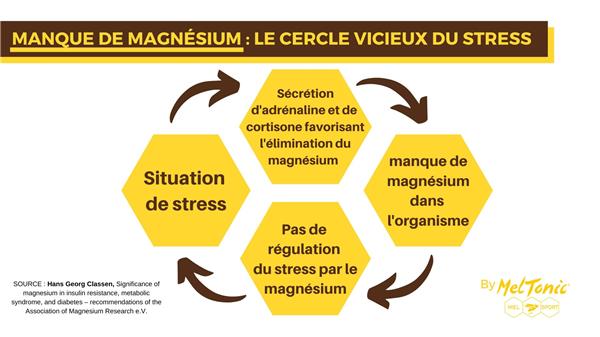How do you know if you are lacking in magnesium ?
Categories :
Advice
About 70% of French people have a magnesium deficiency (Suivimax study)
And it is even more true for athletes. A regular practice of sports leads to a greater need for magnesium by the body (15 to 20% higher than a person not practicing sports)
*Magnesium intake required per kilo: 6 mg (7.2 mg for athletes)
Yes, numbers are nice, but let's get down to the facts! How to know if you lack magnesium?
A magnesium deficiency may be the cause. Indeed, magnesium is a trace element, and it is partly responsible for the cellular exchanges in our body. A magnesium deficiency in athletes therefore creates an imbalance in the metabolism and promotes cramps during exercise.
Magnesium has an important role in the Krebs cycle (cellular reaction at the origin of energy creation). A magnesium deficiency will slow down this cycle. You will therefore take longer to emerge in the morning and be abnormally tired during the day.
Are you anxious? Stressed? A magnesium cure can be welcome. Indeed, the "stress hormones": adrenaline and cortisol prevent magnesium from acting on our body. Whereas magnesium is supposed to regulate these hormones. If you enter this "vicious circle of stress" a regular intake of magnesium is strongly advised to restore your balance and reduce your stress.

Magnesium plays an important role in your sports performance. In case of deficiency, your VO2MAX is impacted. Indeed, magnesium is a trace element necessary for the creation of energy (kreps cycle), for the proper functioning of muscles and for the synthesis of proteins. If you observe a drop in sports performance, a lack of magnesium may be the cause.
Magnesium helps regulate blood flow, especially in the head. Studies have shown that during migraines, magnesium levels drop. People who have enough magnesium in their body are therefore less vulnerable to headaches.
Magnesium is essential for the proper functioning of the neuromuscular system. A magnesium deficiency would therefore lead to a decrease in the athlete's ability to recover.
Some foods are rich in magnesium such as :
Wholemeal bread, rice, lentils, spinach, bananas or almonds (and many more)
However, it is difficult to have the recommended daily intake of magnesium. Especially for athletes.
To combat this problem, we have developed Magnesium Tonic. A natural food supplement in the form of capsules. Our pot of 180 capsules will allow you to make a cure of magnesium of 3 months. Take advantage of a natural marine magnesium intake (extracted from the shores of the Dead Sea) to alleviate the various signs explained above.
